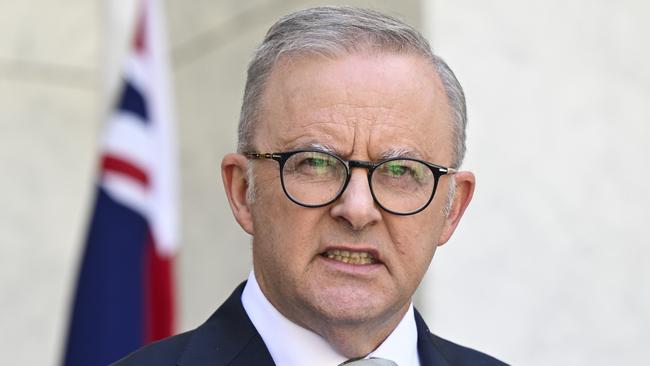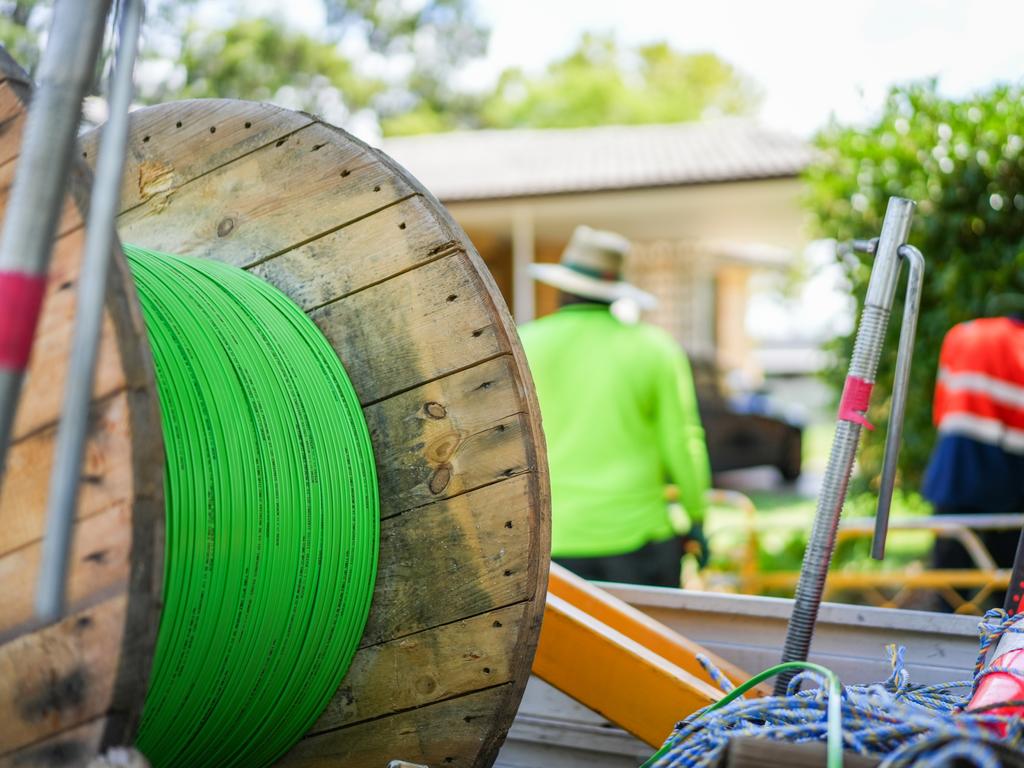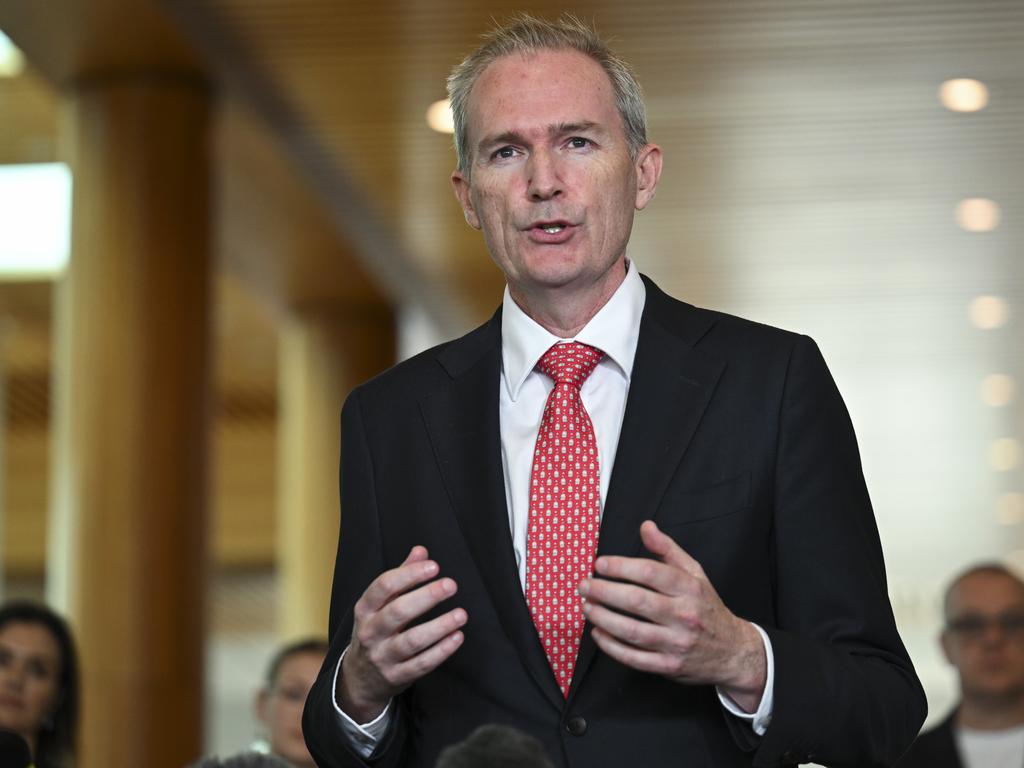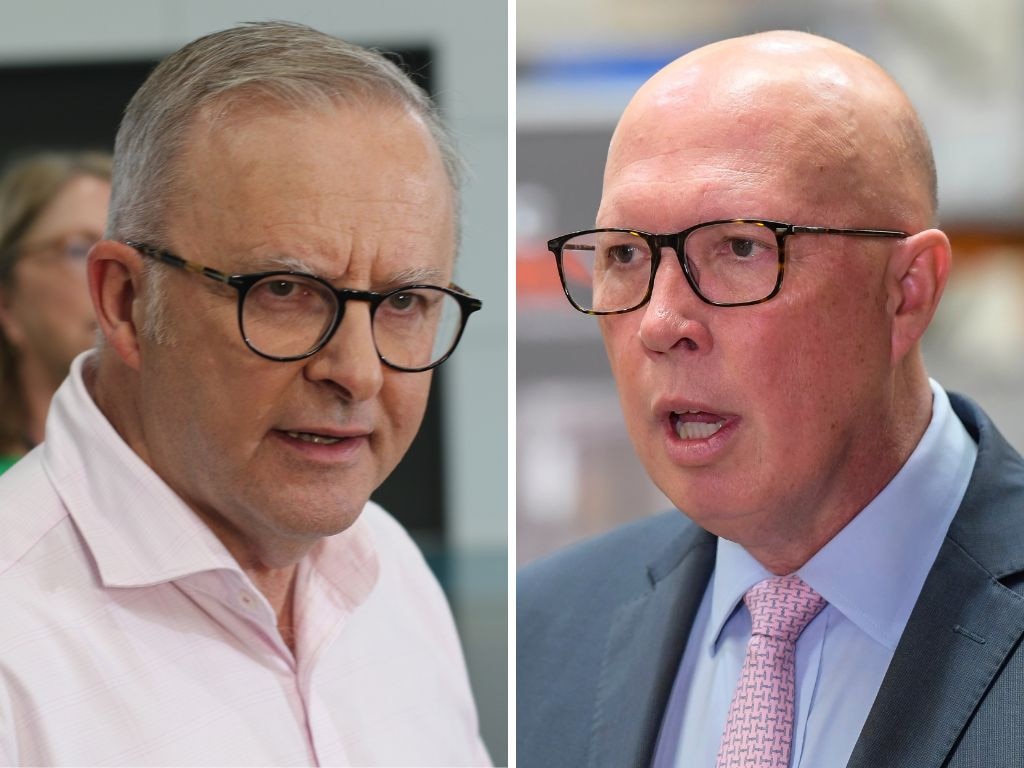Labor pours extra $3bn into National Broadband Network
Anthony Albanese has promised to ‘finish’ the National Broadband Network, with Labor committing funds to provide 622,000 premises with access to fibre connections by 2030.

Anthony Albanese has ramped up his re-election pitch on the need for increased federal spending to “build” Australia’s economic future, pouring an extra $3bn in the National Broadband Network while accusing Peter Dutton of wanting to privatise the entity.
After the Opposition Leader declared over the weekend it was private enterprise and not expansive government that would underpin Australia’s future prosperity, the Prime Minister moved to revive the NBN as a political issue by vowing to “finish” the broadband infrastructure program first proposed by Kevin Rudd more than 15 years ago and keep it in public hands
The equity injection would bring faster internet speeds to 622,000 households and businesses, with 95 per cent of these users to be directly connected to the fibre network rather than slower copper cables championed by the Abbott and Turnbull governments.
The government is claiming the upgrades, to be completed by 2030, would deliver a $10bn boost to the nation’s gross domestic product over the next decade.
It takes the total cost to taxpayers since the NBN’s launch in 2008 to more than $35bn, even as analysis conducted by the Productivity Commission estimated the market value of the asset at $19.7bn in 2021-22.
Mr Albanese argued the equity injection – which would be matched with a separate $800m commitment from the NBN Co – would drive economic growth and productivity.
“It is absolutely critical to the way that a modern economy and a modern society functions,” Mr Albanese said.
“A whole lot of small business operators or sole traders operate completely from home. That is how they function. That boosts productivity and can make an enormous difference.
“The changing nature of our economy means that flexibility is important. And one of the things this does is enable that flexibility to boost productivity as well.”
As Labor gears up for a fear campaign over the future of public services if the Coalition wins the election, Mr Albanese challenged Mr Dutton to back Labor’s bill to ban privatising the NBN when parliament resumes in February.
Mr Albanese’s signal that parliament will resume next month comes as both the Coalition and Labor will this month unveil minor changes to their frontbenches, given the pending retirements of Bill Shorten, Simon Birmingham and Paul Fletcher. “We want to not only complete the rollout of a fibre-based NBN but importantly as well, we want to keep it in public hands,” Mr Albanese said.
“We know that private interests are interested and have obligations to be interested in private profit. We know that’s what happened when Telstra was privatised. We know that for those people in regional communities in particular, that they would suffer if the NBN was sold off to the highest bidder.
“When Australians own their NBN, high-speed internet remains affordable for all Australians and only Labor will deliver this.”
The Coalition has already ruled out privatising the NBN if Mr Dutton becomes prime minister. Opposition communications spokesman David Coleman said the Coalition would support the NBN investment.
“We won’t be standing in the way of this. We’ll take advice from the Department of Finance, if we’re successful in the election, on the best way of implementing this new investment,” he said.
The proposal was criticised by TPG, one of the nation’s biggest broadband providers, which argued Labor should be fixing areas where competition has broken down rather than building networks, as scores of Australians switch to satellite and 5G services.
A TPG spokesman told The Australian it made little sense for the government to be further investing in networks that are putting up competition.
“The primary focus of NBN should be on delivering affordable broadband to Australians, with investment focused on areas not served by existing infrastructure,” the spokesman said.
Independent economist Saul Eslake questioned whether Labor’s $3bn investment would deliver the productivity dividends it had touted.
“It’s not obvious to me that another $3bn on top of however many tens of billions that have already been spent is going to make a huge difference to productivity,” he said.
“Neither is Australia’s productivity problem going to be solved by the kind of sloganeering that the Coalition’s come up with about backing small businesses and slashing red tape.”
Telecommunications analyst Paul Budde said if the government was to sell-off the NBN, no one would be prepared to pay the $50bn that has been poured into it between the government and private investors.
“If you want to privatise then you’d have to do so at a huge discount in order to attract somebody to take it over,” he said.
“But you would never be able to cover your full investment.”
Mr Budde said the Productivity Commission’s $20bn valuation “would be a lot” for the asset, and selling it at an even greater loss would be a “major political drama”.
New Street Research senior telecommunications analyst Ian Martin said a privatised NBN would face competition from satellite-based services, including Elon Musk’s booming Starlink services, and the introduction of 6G fixed wireless.
“While they won’t completely displace the NBN, they’re probably going to creep far more into NBN’s space, and that wouldn’t be the case for the NBN itself if it was a commercial business,” he said.
Despite claiming the $3bn investment would ensure the NBN remained affordable, Communications Minister Michelle Rowland remained coy on how the service would compete on price with far cheaper mobile and fixed wireless services.
“Fibre is regarded across the world and certainly by NBN Co as the standard when it comes to ensuring the highest-quality broadband services,” Ms Rowland said, instead pointing to faster speeds that the service provided.
“While mobile services are complementary to fixed services, the laws of physics mean that they simply cannot deliver the same capabilities because mobile services are dependent on the number of users on the network at any given time.”
While initially intended to provide fibre to all premises, in 2013 the newly elected Abbott government instead pushed ahead with a hybrid model whereby some premises would instead receive fibre to the “node” – a central location on their street – with pre-existing copper wiring then taking the internet its last stretch to households and businesses. In an about-face, the Morrison government reversed this plan and committed, with Labor’s support, to phasing out copper connections.
Due to Treasury’s accounting rules, the equity injection will be classified as an “investment” and will not impact the underlying cash balance despite its impost to taxpayers. Rather, the funding will be tallied among so-called “off-budget” measures that will affect the lesser-known headline cash balance, projected to record a deficit of $47.7bn this financial year, according to December’s mid-year budget update.
That figure is $20.3bn lower than the $26.9bn underlying cash deficit that has been more widely reported and is due to the booming growth of off-budget spending, including Labor’s plan to wipe $16bn in student debts.
With Labor unveiling more than $10bn in spending so far this year, veteran budget watcher Chris Richardson said taxpayers money should not be wasted on “politically smart” ventures.
Additional reporting: Joseph Lam






To join the conversation, please log in. Don't have an account? Register
Join the conversation, you are commenting as Logout